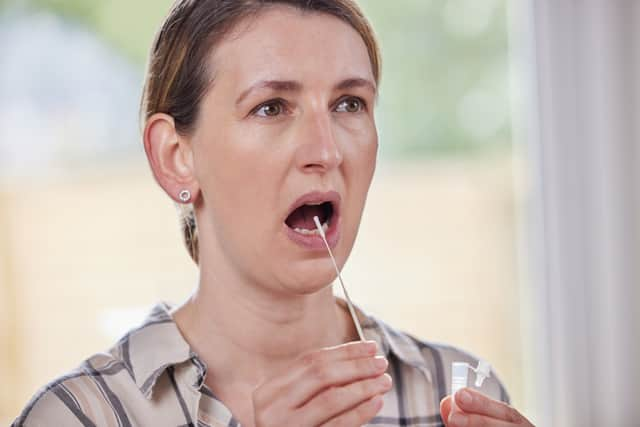What do I do if I test positive for Covid? Rules on self isolation in the UK - can you go to work?
and live on Freeview channel 276
Covid infections are rising across all four UK nations, with the recent surge driven by two newer Omicron variants.
Figures from the Office for National Statistics (ONS) show that the virus is becoming more prevalent, with 1.7 million people estimated to have had the virus in the week 10 17 June,
Advertisement
Hide AdAdvertisement
Hide AdThe number of people in hospital with Covid is also on an upward trend in most parts of the country, but the virus continues to be most prevalent in Scotland.
The ONS said the latest increase was “likely caused by infections compatible with Omicron variants BA.4 and BA.5”, which are now thought to be the most dominant strains in much of the UK.
There is “currently no evidence” that these strains lead to more serious symptoms than previous variants, but health experts have warned that nearly one in six people aged 75 and over have not received a booster dose of vaccine in the past six months, putting them more at risk of severe disease.


The legal requirement to self-isolate if you test positive for Covid was scrapped earlier this year, with people instead advised to take “personal responsibility”.
Advertisement
Hide AdAdvertisement
Hide AdGuidance on what to do if you have the virus still remains, but advice varies slightly depending on where you live.
If you fall ill with coronavirus or think you may have it, this is the guidance in place across the four nations.
Do I need to self isolate if I test positive for Covid?
England
In England, it is recommended that you follow NHS guidance if you feel unwell. The NHS says you should stay at home and avoid contact with other people if you:
- have any symptoms of Covid and have a high temperature, or you do not feel well enough to go to work or do your normal activities
- have tested positive for Covid
If you have Covid you can pass on the virus to other people for up to 10 days from when your infection starts, although many people will no longer be infectious to others after five days. Those who test positive are urged to avoid meeting people at higher risk from Covid for 10 days.
Scotland
Advertisement
Hide AdAdvertisement
Hide AdIf you live in Scotland, the Scottish Government recommends following the advice on NHS Inform.
If you test positive, you should stay at home and avoid contact with other people for five days after the day you took your test, or from the day your symptoms started (whichever was earlier).
If you have not tested positive, you should try to stay home until you feel better.
Wales
In Wales, you should self-isolate and order a test if you display Covid symptoms and continue to self-isolate until you get your result.
Advertisement
Hide AdAdvertisement
Hide AdIf the test is negative you can leave isolation immediately, but if it is positive you should isolate for five full days and then take another test, plus another the following day.
If both are negative you can leave isolation. If either one is positive, you should continue isolating until you get two negative results in a row, or until day 10, whichever is sooner.
Northern Ireland
In Northern Ireland, people are advised to isolate immediately if they have Covid symptoms or have tested positive.
If you display Covid symptoms you should self-isolate, order a test and remain in isolation until you get your result.
Advertisement
Hide AdAdvertisement
Hide AdIf the test is negative you can leave isolation immediately. If it is positive, you should stay at home and avoid contact with people for five days after the day of the test, or from the day symptoms started - whichever was earlier.
As children tend to be less infectious than adults, this period is reduced to three days for children and young people under the age of 18.
Comment Guidelines
National World encourages reader discussion on our stories. User feedback, insights and back-and-forth exchanges add a rich layer of context to reporting. Please review our Community Guidelines before commenting.
